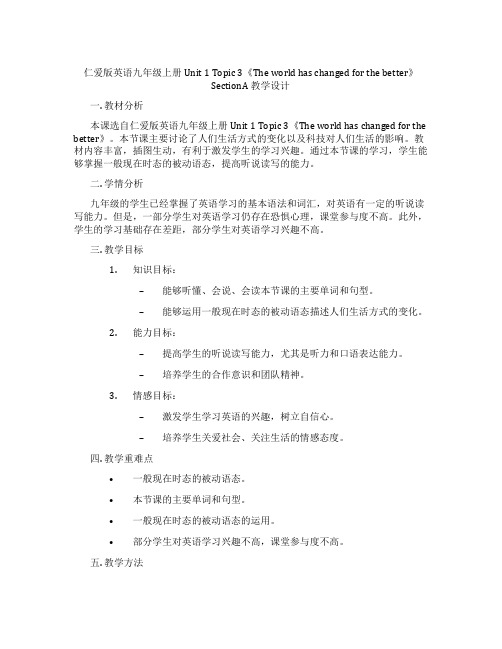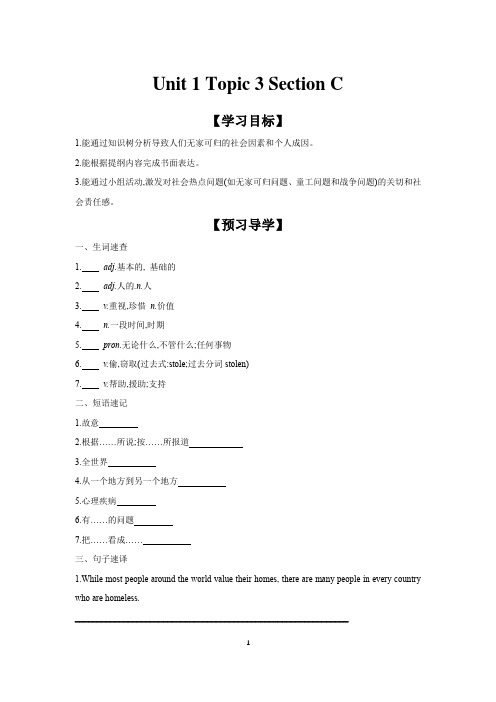2019精选教育新仁爱版九年级上册英语 Unit1Topic3 SectionC 学案 ( 无答案).doc
仁爱版英语九年级上册Unit 1 Topic 3《The world has changed for

仁爱版英语九年级上册Unit 1 Topic 3《The world has changed for the better》SectionA 教学设计一. 教材分析本课选自仁爱版英语九年级上册Unit 1 Topic 3《The world has changed for the better》。
本节课主要讨论了人们生活方式的变化以及科技对人们生活的影响。
教材内容丰富,插图生动,有利于激发学生的学习兴趣。
通过本节课的学习,学生能够掌握一般现在时态的被动语态,提高听说读写的能力。
二. 学情分析九年级的学生已经掌握了英语学习的基本语法和词汇,对英语有一定的听说读写能力。
但是,一部分学生对英语学习仍存在恐惧心理,课堂参与度不高。
此外,学生的学习基础存在差距,部分学生对英语学习兴趣不高。
三. 教学目标1.知识目标:–能够听懂、会说、会读本节课的主要单词和句型。
–能够运用一般现在时态的被动语态描述人们生活方式的变化。
2.能力目标:–提高学生的听说读写能力,尤其是听力和口语表达能力。
–培养学生的合作意识和团队精神。
3.情感目标:–激发学生学习英语的兴趣,树立自信心。
–培养学生关爱社会、关注生活的情感态度。
四. 教学重难点•一般现在时态的被动语态。
•本节课的主要单词和句型。
•一般现在时态的被动语态的运用。
•部分学生对英语学习兴趣不高,课堂参与度不高。
五. 教学方法1.任务型教学法:通过小组合作、任务完成的方式,激发学生的学习兴趣,提高学生的参与度。
2.情境教学法:创设生活情境,让学生在真实的环境中学习英语,提高学生的语言运用能力。
3.激励性评价:注重鼓励学生,激发学生的自信心,让学生敢于开口说英语。
六. 教学准备1.教学课件:制作多媒体课件,包括图片、视频、音频等素材,丰富教学内容。
2.教学道具:准备相关的生活用品,如手机、电脑等,用于创设情境。
3.教学资源:收集相关的英语学习资料,为学生提供丰富的学习资源。
仁爱科普版九年级上册Unit 1 The Changing World Topic 3 Sectio

Unit 1 Topic 3 Section C【学习目标】1.能通过知识树分析导致人们无家可归的社会因素和个人成因。
2.能根据提纲内容完成书面表达。
3.能通过小组活动,激发对社会热点问题(如无家可归问题、童工问题和战争问题)的关切和社会责任感。
【预习导学】一、生词速查1.adj.基本的, 基础的2.adj.人的.n.人3.v.重视,珍惜n.价值4.n.一段时间,时期5.pron.无论什么,不管什么;任何事物6.v.偷,窃取(过去式:stole;过去分词stolen)7.v.帮助,援助;支持二、短语速记1.故意2.根据……所说;按……所报道3.全世界4.从一个地方到另一个地方5.心理疾病6.有……的问题7.把……看成……三、句子速译1.While most people around the world value their homes, there are many people in every country who are homeless.______________________________________________________________2.Sometimes people are homeless because they have a problem with drugs or because they have a mental illness.______________________________________________________________3.Whatever the cause of homelessness is, the effects are the same.______________________________________________________________4.The government in every country has worked for many years to support the homeless but more needs to be done.______________________________________________________________5.We must think of the homeless as people, not just as problems.______________________________________________________________四、想一想预习课本1a,回答下列问题。
2019仁爱版九年级英语上册 Unit 1 Topic 3 Section A 课件(共16张PPT)教育精品.ppt

1.You have been in New York for a long time. 2.The city has improved a lot since I came here a few
years ago .
millions of people 数百万人
Summary:
1. Some words: block, artist, visitor, industry, chemistry,term
2. Some phrases: as a matter of fact , millions of 3. Some sentences:
用现在完成时的标志副词完成下列句子 1.—Have you_____ been to Beijing ?
—Yes, I have . I have _____ come back . —No, I haven’t . I have _____ been there .
2.—How long have you been in Beijing? —I have been there there____two weeks. —I have been there ______last week.
past
came here
present
★since +从句(从句谓语动词用过去
式)
past
since 1980 1980
preseபைடு நூலகம்t
e.g. She has been in the school __s_in_c_e__1980.
★since +过去的时间点
2019-仁爱九年级上册Unit1Topic3 SectionA(共21张PPT)-文档资料

Summary:
1. Some words: block, artist, visitor, industry, chemistry,term
2. Some phrases: as a matter of fact , millions of 3. Some sentences:
1. You will get used to it very soon if you come. 2. As a matter of fact , it’s a wonderful place to live . 3. You must come for a visit . 4. Then you can see New York yourself .
since + 时间段+ago
for+时间段
I have worked in the school for three years . =I have worked in the school since three years ago . =I have worked insintchee+时sc间h段oo+algsoince 2011. =I have worked here since I came to the school .
Unit 1 The Changing World
Topic 3 The world has changed for the better .
Section A
In the past
As a matter of fact/ In fact, I am strong.
as a matter of fact = in fact
for + 时间段
2019精选教育仁爱九年级上册Unit1Topic3 SectionC(共14张PPT).ppt

are the same … /The effects are
different. Some are…
A: What have governments /people
done to help?
B: They have …
A: Have they done enough?
B: …
A: What can we do now?
3. Some people are homeless for a short __p_e_ri_od__ of time.
4. No one is ever homeless on _pu_r_p_o_s_e__. 5. _W_h_a_t_e_ve_r___ the cause of homelessness is , the effects are the same. 6. Homeless people sometimes __s_t_e_a_l ___ food just to eat.
Blackboard design
The world has changed for the better.Section C
Homework
1.Retell 1a. 2.Do some exercises. 3.Write down a passage about one of the three pictures. 4.Preview 1a.
2.What do you think of the homeless people?
3.What can we do to help them?
1b Listen to 1a and choose the best title.
A. A Serious Problem—Homelessness
2019-仁爱九年级上册Unit1Topic3 SectionA(共26张PPT)-文档资料

about New York.
In the past Nowadays
terrible traffic dirty streets unfriendly people dangerous to live less shopping centers beautiful parks clean and fresh air huge markets famous museums good schools excellent restaurants
the streets _w_e_r_e_d_i_r_ty_. Bob says the city h_a_s__im__p_r_o_v_e_d_ a lots_in__c_e_ he came here a few years ago. _A_s__a_m__a_t_te_r_o__f _fa_c_t__, it’s a wonderful place to live. There are beautiful parks, good s_c_h_o_o__ls_, famous m__u_s_e_u_m__s and _e_x_c_e_ll_e_n_t restaurants. You must come for a _v_i_s_it.Then you can _s_e_e_ New York _y_o_u_r_s_e.lf
• 2.some sentences:
• 1.You will get used to it very soon if you come. • 2.As a matter of fact, it's a wonderful place to live. • 3.You must come for a visit. • 4.then you can see new York yourself. • 5.How much do you know about the traffic in New York? • 6.Do you have any ideas about the streets there? • e the Present Perfect Tense with for and since • 1.You have been in New York for a long time • 2.The city has improved a lot since i came here a few years ago.
仁爱英语九年级unit1topic3课文翻译

Unit 1 Topic 3Section A(海伦和鲍勃正在打电话。
)你在纽约很时间了。
你觉得住在那儿怎么样?好极了,我真的很喜欢。
但我听说当地的交通很糟糕,而且几乎每个人都开车太快。
噢,如果你来,你很快就会习惯的。
我还听说街道很脏。
过去是这样,但自从几年前我来到这儿之后,城市(面貌)已经改善了很多。
难道住在那儿不危险吗?噢,过去很危险,但现在很安全。
事实上那是一个极好的居住地。
在我们街区附近有美丽的公园,好的学校,著名的博物馆和豪华的饭店。
如果你喜欢,你可以每天去看戏剧、欣赏音乐会和歌剧。
你一定要来纽约参观,那样你可以亲自看一看纽约。
Section B简,你在看什么?我在看一份加拿大的报纸,马丁介绍了一篇很有趣的文章。
它是关于救助无家可归的人的一个计划。
加拿大有无家可归的人吗?噢,有。
许多国家都有无家可归的人。
这篇文章中写道有个城市有一个极好的计划。
自从计划实施以来,已经帮助数以百计的人重返工作岗位,从而使他们过上正常的生活。
听起来好极了!他们是如何做的?噢,他们一旦发现处在困境中的人,就选定适当的方式来给他们提供帮助。
无家可归的人能够获得充足的食物、住所和医疗吗?是的,还不知这些。
这个还向他们提供职业培训,以便他们能再次找到工作。
我认为对于这些人来说自信心是很重要的。
你说对了。
世界已经变得更加美好了。
Section C人类最基本的需求之一是家。
家是一个安全的地方。
尽管世界上大多数人都珍视他们的家,但是每个国家却总有很多无家可归的人。
有些人只是短时间的无家可归,因为他们从一个地方搬到另一个地方,而其他的人没有能力找到家。
他们必须住在街上或收容所。
有许多原因造成无家可归。
有时不能养家是因为他们没有挣到足够的钱,或者因为他们没有工作。
有时人们无家可归是因为他们存在毒品问题或是精神疾病。
在任何时候都没有人想故意无家可归。
不管是什么原因造成了无家可归,其结果总是相同的。
无家可归的人必须努力地维持生计。
英语九年级上Unit1Topic3知识点梳理

仁爱版英语九年级上Unit 1 Topic 3知识点梳理Sectio n A探短语集锦1. 1) Hele n is talki ng with Bob on the phone. (提问)How is Helen talking with Bob?2) I ofte n chat with my good friend on the Internet.(提问)2. How do you like … ? = what do you thinkof?eg: 1) How do you like the movie?=What do you think of the moive?2) How do you like living there? (同义句)=What do you think of living there?3. get used to doing sth = beused to doing sth:习惯于做…eg: 1) Lily is used to going to bed early.=Lily gets used to going to bed early.2) My father is / gets to (smoke). It ' s bad for his lungs.4. 含有used的句子变成一般疑问句时在句首加Did,加了Did之后,后面的used 去掉d还原成use;含有used的句子变成否定句时,在used 的前面加didn ',t加了didn '之后,后面的used 去掉d还原成use.eg: 1 )1 used to enjoy liste ning to pop music. (改为一般疑问句)Did you use to enjoy liste ning to pop music?2) My sister used to play the pia no.(改为否定句)My sister didn ' t use to play the piano.3) Jane used to be a teacher.(改为一般疑问句)5. Isn ' it dangerous there?在那儿难道它不危险吗?这是一个反问句,在英语中,反问句也可称为否定疑问句,常译为难道不…吗?结构为:be /助动词/情态动词的否定+ 主语+谓语+…eg:1) Didn ' t he go to the park yesterday?2) Can ' t Lily play the piano?3) Hasn' t Jim been to the Great Wall?4) Won' t they go climbing next Sunday?注意:在回答反问句时,要反着译即Yes 译为No , No译为Yes.1) Did n 'the go to the parkyesterday?Yes, he did. / No, he didn 't.不他去了是的他没去2) Won't they go climbing next Sunday?Yes, t hey will. / No, they won' t.不他们要去是的他们不去6. as a matter o f fact = in fact 意为事实上;实际上7. come for a visit 来参观8. see …on eself亲眼目睹eg:1)Isaw Beijing myself last summer holiday.2) Lily saw Jim steal Lucy ' purseDid Jane use to be a teacher?herself last Friday.9. Sth happen to sb某事发生/降临在某人身上happen to do sth 碰巧做某事eg: 1) A traffic accide nt happe ned to Lily last week..2) Li Ming happened to meet a film staron the street yesterday.10. take care of = look after = care for 照顾,关心Sectio n B1. show sb sth = show sth to sb展示某物给某人看show sb around + 地点:带领某人参观某地eg: 1) Please show me your photo.(同义句) =Please show your photo to me.2) I will show Miss Gao some flowers.(同义句)=I will show some flowers to Miss Gao.3) My mother showed me around he factory yesterday after noon.2. homeless people无家可归的人3. return to work 重返工作岗位4. live a normal life 过着正常的生活live a hap py life 过着幸福的生活5. Once连词意为一旦.....就..... 在句中引导时间状语从句eg: 1) Once you take drugs, it is difficult to give it up. 你一旦吸毒,戒掉它是困难的2)Once you get into a bad habit, you will find it hard to get out of. 一旦你染上坏习惯,想改掉就难了6. provide sb with sth = provide sth for sb为某人提供某物eg : 1) The government often provides homeless people with houses.(同义句)=The government often provides houses for homeless people.2) My un cle provided the poor girl with some clothes last mon th.(同义句)=My uncle provided some clothes for th poor girl.7. so that = in order that = in order to 为的是;以便于eg:1) Lily got up early this morning so that she could catch the first bus. (同义句)=Lily got up early this morning in orderthat she could catch the first bus.=Lily got up early this morning in order to catch the first bus.8. feel good about 对…好feel good about on eself 自我感觉良好eg:1) Do you ofte n feel about yourself?2) Do you feel good about this hairstyle?9. thanks to多亏,由于有时可与because of替换eg: Thanks to the one-child policy, the world has changed for the better.(同义句)=Because of the one-child policy, the world has cha nged for the better.10. It is + 形容词+ for sb + to do sth: 做....对某人来说它是....样的eg:1) It is difficult for me to learn En glish well.2) It is good for our eyes to do eye exercises.11. not only … but also … 不但…而且…not only …but also与both … and同义所不同的是not onlly…but also ••连接两个主语时应采用就近原则,即后面的谓语应根据also后面的人称来确定eg:1) Not only Lily but also I am a teacher.=Both Lily and Lucy are teachers.2) Not only Jim but also Ka ng Kang (like) En glish.= Both Jim and Kang Kang(like) En glish.Sectio n C1. be famous for :因…而出名be famous as:作为… 而出名eg: 1)Chongqing is famous for its hot food, 2) Jay zhou is famous as a sin ger. 2. borrow 借(借进)borrow sth from sb 向某人借某物le nd 借(借出)lend sb sth = lend sth to sb 借某物给某人eg: 1)I borrowed an English book fromJim just now. (同义句)=Jim lent an English book to me just now.2) Lily borrowed a CD from Miss Gao yesterday.(同义句)=Miss Gao lent a CD to Lilyyesterday.3. rent sth from sb向某人租用某物rent sb sth = rent sth to sb 租某物给某人eg: 1)I often rent a bike from the company.(同义句)=The compa ny ofte n rent a bike to me.2) My sister rented a story bookfrom Lily last week.=Lily rented a story book to mysister last week.4. buy sb sth = buy sth for sb 为某人买某物eg:1) My father bought me a new bike last Sun day.(同义句)=My father bought a new bike for melast Sun day.2) We are going to buy miss Gaosome flowers.(同义句)= We are going to buy some flowers for Miss Gao.5. prepare for = get ready for 为… 作准备eg:: 1) Lily is preparing for the comingEn glish exam. (同义句)=Lily is getting ready for the coming En glish exam.2) We are prepari ng for the soccer game n ext Friday. (同义句)=We are getting ready for the soccer game next Friday.6. at the same time 同时on time按时in time 及时at times = sometimes 有时once upon a time 从前7. return归还;返回return sth to sb = give sth back to sb归还某物给某人return to + 地点=go back to + 地点返回到某地eg: 1)My brother returned these books to the library yesterday. (同义句)=My brother gave these books back to the library.2) I will return the CD to Jim.(同义句)=I will give the CD back to Jim.3) Maria will return to Cuba next week.(同义句)=Maria will go back to Cuba n ext4) I returned to my hometown to visit my gran dpare nts last summer holidays.=I went back to my hometow n to visit mygra ndpare nts last summer holidays.8. finish意为完成;结束fin ish doi ng sth 完成做某事eg: 1) We will finish ___________ (build) the bridge on time.2) You can watch TV after you finish________ (do) your homework.9. strict意为严格的be strict with sb 对某人要求严格be strict in sth对某事要求严格eg:1) My father is very strict with me.2) Our En glish teacher is very strict withus.10. obey strict rules遵守严格的规章制度break the rules 违反规则11. take drugs 吸毒12. steal things 偷东西13. help sb to do sth 帮助某人做某事Help sb with sth 在…方面帮助某人14. try on 试穿try to do sth尽力/努力做某事try one ' s best = do one ' s best尽某人的最大努力try one ' s best to do sth = do oneto do sth 尽某人的最大努力做某事eg: 1 )1 will try my best ________ (learn) En glish well this term.2) Lily is trying __________ (think)about the math problem.3) The doctors are trying their best —(save) the sick boy.Sectio n D1. know about 了解eg:1) Do you know about the culture ofChi na?2) I want to know about the truth of theaccide nt.2. aim to do sth旨在/致力于做某事1) He aims _________ (be) a teacherlike hisfather in the future.2) The project aims ________ (provide) some work cha nee for the homsless people.3. at home and abroad 国内夕卜4. pay for支付;付款pay +钱+for sth为某物支付…钱eg:1) He paid ¥300 for the coat.2) Project Hope has paid for the education of 2.5 millio n poor stude nts.5. 与send相关的短语send sb to +地点送某人去某处send sb to do sth打发某人去做某事send for派人去请send away撵走;开除;解雇send up发射6. Without the help of Project Hope, she couldn ' t continue her studie同义句) =Thanks to Project Hope, she couldcontinue her studies.=With the help of Project Hope, she could 或砧耐© her studies.Week7. hundred (百);thousand (千);million(百万)注意:在这些词的前面数字不管是几,它们后面不加s;但如果它们与of连用;它们后面要加s.eg:1) two hun dred three thousa ndseve n millio n five hundrednine thousa nd eight millio n2) hun dreds of thousands ofmillio ns of8. in need处于困难中in trouble陷入困境中indan ger 处于危险中i n idetail详细地9. wit h介词可有多种意思1)with 有着2)with 和3) with 表伴随4) with 用eg:1) Do you know about the girl with blo nd hair? 有着2)I ofte n have dinner withLily.和3)Lily with his parents often goes shopp ing . 表伴随4) Mr. Green often takes a pen with him.表伴随5) You can buy a big house with these mon ey.10. decide意为决定decide to do sth决定做某事decide on选定;决定eg:1)Lily decided _________ (visit) the Great Wall at last.2) I can't decide on which skirt I shouldbuy.探精讲精析1. for和since的用法for + 一段时间since +过去的时间点/ 一段时间+ago /含有一般过去时的句子用for和since填空1) I have been in China ________ 3 years.2) My gran dpare nts have lived heretwo years ago.3) We have bee n friends aboutthree years.4) I have studied En glish 3 yearsago.5) They have lived there sixyears.6) He has taught in China 2006.7) His En glish has improved a lot he joined the En glish club.8) He has lear ned muchEnglish he went to En gla nd five years ago.2.对含有for和since的句子提问用How long多久eg:1) I have been in China for 3 years.(提问)How long have you bee n in China?2) My parents have lived here since twoyears ago.How long have your pare nts lived here? 3. since前的句子用现在完成时;since后的句子用一般过去时eg:1) I __________ (be) in China since I(come) here.2) His oral En glish (improve) since he(join)the En glish club.4. 在现在完成时中,瞬间动词不能与含for和since表示一段的时间状语连用,如果要连用,瞬间动词要作相应的变化应转换成延续性动词,变化如下:leave ______ b e away (from) die __________ be deadbuy _____ haveborrow ____ k eepjoin _______ b e in / be a member ofbegi n ______ be oncome / go / arrive ______ be ineg: 1)My grandfather has died for 30 years.(误)My grandfather has been dead for30 years.(正)My grandfather has been dead since 30years ago.(正)2)I have borrowed the book for two weeks.(误)I have kept the book for two weeks.(正)I have kept the book since two weeks ago.(误)3)Lily has bought the skirt for five weeks(误)Lily has had the skirt for five weeks.(正)Lily has had the skirt since five weeksago.(正)5. 句型转换1) I jo ined the Army two years ago. (同义句)=I have bee n the member of the Army for two years.=I have bee n in the Army since two yearsago.=It is two years since I jo ined the Army.=Two years has passed since I jo ined theArmy.2) Her father died three years ago. (同义句)=Her father has bee n dead for three years.=Her father has been dead since three yearsago.=It is three years since her father died.=Three years has passed since her fatherdied.3) My sister borrowed the book two weeks ago.(同义句)=I have bee n in the Army for two years.。
- 1、下载文档前请自行甄别文档内容的完整性,平台不提供额外的编辑、内容补充、找答案等附加服务。
- 2、"仅部分预览"的文档,不可在线预览部分如存在完整性等问题,可反馈申请退款(可完整预览的文档不适用该条件!)。
- 3、如文档侵犯您的权益,请联系客服反馈,我们会尽快为您处理(人工客服工作时间:9:00-18:30)。
Unit1 Topic3 SectionC 精品学案
学习目标:1.掌握本课的重点词汇和短语,巩固现在完成时的用法。
2.运用不同的阅读方法找出文章主题,段落主旨句和细节描述。
重点:能通过语境猜测词义,扫清阅读障碍,能谈论和表达与本文相关材料的话题。
难点:口头报告和书面写作时,能有意识地使用“cause and effect”来组织段落。
课前预习:
1.阅读1a ,找出下列单词和短语,记熟它们。
basic, human, value, period, whatever, steal, support, shelter, homelessness, earn, drug, mental, on purpose, effect, phrase, according, context, laborer, cruel, basic needs, a short period of, one place to another, in a shelter, mental illness, on purpose, think of …as
2.Read 1a carefully and find out the following sentences and translate them into Chinese:
1)One of the most basic human needs is a home.
2)Sometimes people are homeless because they have a problem with drugs or because they have a mental illness.
3)No one is ever homeless on purpose.
4)We must think of the homeless as people, not just as problems.
3. Read 1a again and finish 1b,1c and 1d in the text book.
Teaching procedure
Ⅰ.预习展示:
1. Get the students to finish Task 1 in Pre-Learning part and assess.
2. Get the students to finish Task 2 in Pre-Learning part and assess
Ⅱ.合作学习展示:
1.Read 1a in groups and then act it out in class.
2.Read 1a and finish 1b and assess.
3.Read 1a and finish 1c with the students and assess.
4.Read 1a and finish 1d:answer the questions in 1d.
Ⅲ.巩固落实:
1.Finish 2with the students: Work in groups. Look at the photos and discuss the causes and effects.
2.Finish 3: Work in groups and then act it out.
Discuss in groups first and then write a cause and effect passage based on2 .
3.Try to retell the passage.
Ⅳ.当堂检测:
According to 1a and fill in the blanks.
1). One of the most _______ human needs in a home.
2). Most people in the world ________ their homes.
3). Some people are homeless for a short _______ of time.
4). No one is ever homeless on ________.
5). __________ the cause of homelessness is, the effects are the same.
6). Homeless people sometimes _________ food just to eat.
7).The government in every country has worked for many years to _______ the homeless but more needs to be done.。
